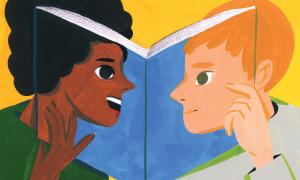3,150 Results
Section II: Classroom Culture
Celebrating Freedom Means Celebrating Defiance

“It’s Okay to Be White.” Yes, but…

Teaching in the Shadow of Trauma

Fighting Hate at Schools
For more than a year, TT has been tracking media reports of hate incidents in schools across the country. One thing we've discovered: Only a fraction of the incidents that happen actually make it into the news. This edition of The Moment includes a link to our educator survey so you can help us compile a more complete picture of how hate shows up at school. You'll also find our November Hate at Schools report, along with our guide Responding to Hate and Bias.
- Hate at School: November 2018
- Responding to Hate and Bias at School
Responding to the Chauvin Verdict
Today, Derek Chauvin was found guilty on all charges. But our legal system is still far from just, and many students may still be feeling a lack of closure. In critical moments like these, we know students look to educators for guidance. We hope you’ll reaffirm the value of Black lives. We hope you’ll create a space for students to process—not debate. And we hope you’ll get the support you need. These resources can help you hold space for critical conversations in the days to come.
- Toolkit for Talking About Racism and Police Violence with Students
- Don't Say Nothing
- Let's Talk!
Discriminatory Policies at the Summer Olympics
From a policy banning swim caps designed for natural Black hair to a ruling that several Black women can’t compete because of naturally high testosterone levels, some Olympic policies reflect stereotypes and discriminatory dress codes that many Black girls and women face in schools. As you prepare for next school year, these resources can help you assess your school’s dress code, advocate for inclusion and check that you don’t reinforce harmful stereotypes about women and women athletes.
- Controlling the Student Body
- Loc’d Out: How Thoughtless Dress Codes Can Harm Students From Day One
- We Beasts, We Badasses: Lessons From the Olympics
